
Zoosystematics and Evolution
Scope & Guideline
Exploring the intricate tapestry of biodiversity.
Introduction
Aims and Scopes
- Taxonomic Descriptions:
The journal publishes detailed taxonomic descriptions of new species across various animal groups, including arthropods, mollusks, fishes, amphibians, and reptiles. This contributes to the understanding of biodiversity and provides essential information for conservation efforts. - Phylogenetic Analyses:
Research articles often include phylogenetic analyses that assess evolutionary relationships among species. These studies utilize molecular data, morphological traits, and integrative taxonomy to shed light on the evolutionary history of different taxa. - Biodiversity and Distribution Studies:
The journal emphasizes studies that explore biodiversity patterns and species distributions, often linking these findings to ecological and evolutionary processes. This includes research on hidden diversity and the factors influencing species richness. - Integrative Taxonomy:
There is a consistent focus on integrative taxonomy, which combines molecular techniques with traditional morphological approaches to resolve taxonomic uncertainties and clarify species boundaries. - Geographic and Ecological Context:
Many articles provide insights into the geographic and ecological contexts of species, highlighting the importance of local environments in shaping biodiversity.
Trending and Emerging
- Cryptic Species Discovery:
There is a marked increase in studies focusing on cryptic species, highlighting the hidden diversity within well-known taxa. This trend emphasizes the need for molecular methods in identifying species that may be morphologically similar but genetically distinct. - Integrative Approaches to Taxonomy:
Recent publications show a strong trend towards integrative taxonomy, combining genetic, ecological, and morphological data to resolve taxonomic issues. This approach enhances the robustness of species descriptions and phylogenetic analyses. - Conservation-Related Taxonomy:
An emerging focus on the implications of taxonomy for conservation efforts is evident. Articles increasingly discuss the conservation status of newly described species and the ecological roles they play in their habitats. - Phylogeography and Biogeography Studies:
Research exploring phylogeographic patterns and biogeographical histories of species is trending, linking taxonomy with historical and environmental factors that shape species distributions. - Molecular Phylogenetics:
There has been a rise in the use of molecular phylogenetics to explore evolutionary relationships, reflecting advancements in DNA sequencing technologies and their application in taxonomic research.
Declining or Waning
- Traditional Morphological Taxonomy:
There seems to be a waning emphasis on purely morphological taxonomic studies without molecular support. The recent trend favors integrative approaches that combine molecular and morphological data to provide more comprehensive insights. - Descriptive Studies on Common Species:
The journal has seen a decline in articles focused on the description of common or widely distributed species, as researchers increasingly prioritize unique or cryptic species that contribute new knowledge to biodiversity. - Overlapping Taxonomic Groups:
The focus on taxonomic revisions of well-studied or overlapping groups has decreased, suggesting a shift towards addressing less explored taxa or those with significant conservation implications.
Similar Journals

RAFFLES BULLETIN OF ZOOLOGY
Bridging Knowledge Gaps in Zoology and EcologyRaffles Bulletin of Zoology, published by the National University of Singapore's Lee Kong Chian Natural History Museum, serves as a prestigious platform for the dissemination of cutting-edge research in Animal Science and Zoology, as well as Ecology, Evolution, Behavior and Systematics. With a current impact factor reflective of its Q2 category in both fields, this journal not only enhances its visibility in the academic community but also provides valuable insights into the complexities of biodiversity and conservation efforts. Covering a wide array of topics, Raffles Bulletin facilitates interdisciplinary collaboration and serves as an essential resource for researchers, professionals, and students alike. It is indexed in Scopus, ranking #233 out of 490 in Animal Science and Zoology and #406 out of 721 in Ecology, ensuring that the research published contributes significantly to the global discourse on wildlife and ecosystem management. Since its inception in 1996, this journal has bridged gaps in knowledge and continues to foster a deeper understanding of the living world.
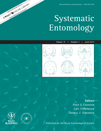
SYSTEMATIC ENTOMOLOGY
Unraveling the Mysteries of Insect SystematicsSYSTEMATIC ENTOMOLOGY is a premier journal published by Wiley, specializing in the field of entomology with a particular focus on insect systematics, ecology, evolution, and behavior. With its strong academic reputation, this journal has achieved a remarkable Q1 ranking in both Ecology, Evolution, Behavior and Systematics and Insect Science categories, affirming its influence and importance in advancing research in these critical areas. SYSTEMATIC ENTOMOLOGY has a broad scope, making it a valuable source for original research, reviews, and methodological advancements that contribute to the understanding of insect biodiversity and systematics. Operating from the United Kingdom, the journal is dedicated to fostering knowledge and innovation within the scientific community, ensuring that high-quality research is accessible to researchers, professionals, and students alike. The journal's consistent publication since 1976 and its continued relevance up to 2024 exemplify its commitment to the field and its readers.
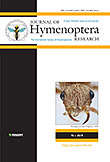
JOURNAL OF HYMENOPTERA RESEARCH
Advancing the Frontiers of Insect ScienceJOURNAL OF HYMENOPTERA RESEARCH is a leading open-access publication dedicated to the advancement of knowledge in the fields of Insect Science, Animal Science and Zoology, and Ecology. Published by Pensoft Publishers since 2011, this journal plays a critical role in facilitating the exchange of significant research findings and insights related to Hymenoptera, a diverse order of insects that includes bees, wasps, and ants. With a commendable impact factor and ranked in the Q1 category for Insect Science and Animal Science, the journal stands out within the scientific community, drawing contributions from researchers globally. Boasting an ISSN of 1070-9428 and an E-ISSN of 1314-2607, the journal not only ensures broad accessibility to its content but also fosters a collaborative environment for professionals and students alike to engage with pioneering research. By reflecting on the converged years of 2007-2024, the JOURNAL OF HYMENOPTERA RESEARCH remains a vital resource for understanding the ecological and evolutionary dynamics of this important group of insects, solidifying its position as a cornerstone in entomological studies.
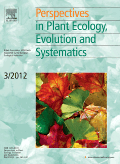
PERSPECTIVES IN PLANT ECOLOGY EVOLUTION AND SYSTEMATICS
Bridging Disciplines for a Sustainable Future in Plant SciencePERSPECTIVES IN PLANT ECOLOGY, EVOLUTION AND SYSTEMATICS is a premier scientific journal published by Elsevier GmbH, dedicated to advancing knowledge and understanding in the fields of plant ecology, evolution, and systematics. With an impressive impact factor and a solid reputation within the top quartile (Q1) of both Ecology and Plant Science categories, this journal ranks among the elite, positioned 100th out of 721 journals in its field, reflecting its significant contribution to ongoing research and academic dialogue. Established in 1998 and converging through to 2024, this journal not only serves as a crucial platform for researchers, professionals, and students alike but also emphasizes innovative methodologies and interdisciplinary approaches to address pressing environmental issues. Although it follows a traditional access model, the wealth of rigorous peer-reviewed articles available will engage the scientific community and facilitate advancements in understanding plant diversity and ecological interactions.
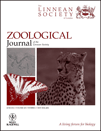
ZOOLOGICAL JOURNAL OF THE LINNEAN SOCIETY
Illuminating the wonders of zoology since 1866.Zoological Journal of the Linnean Society, published by Oxford University Press, stands as a prestigious vessel for scholarly discourse in the fields of Animal Science and Ecology. With an ISSN of 0024-4082 and E-ISSN 1096-3642, this journal has an illustrious history dating back to its inception in 1866, and has consistently contributed groundbreaking research that shapes our understanding of zoology and evolutionary biology. Operating out of the United Kingdom, the journal boasts an impressive Q1 ranking in both Animal Science and Zoology and Ecology, Evolution, Behavior and Systematics, positioning it among the top tier of its category. With a significant presence in the academic landscape, the journal ranks 24th among 490 in Animal Science and 97th among 721 in Ecology, reflecting its impact and relevance in the field. Although it is not an open access journal, the wealth of knowledge it offers is invaluable for researchers, professionals, and students alike, aiding in the advancement of zoological sciences.

Insect Systematics and Diversity
Illuminating the Complexities of Insect LifeInsect Systematics and Diversity, published by Oxford University Press Inc., stands as a leading journal in the realm of entomological research, boasting an impressive impact factor driven by its rigorous peer-review process and high-quality publications. With a focus on animal science, zoology, developmental biology, and insect science, the journal is expertly positioned to address the complexities of insect evolution, behavior, and ecological interactions. Since its inception in 2017, the journal has rapidly gained recognition, achieving Q1 quartile ranks in multiple categories, including Insect Science and Ecology, Evolution, Behavior, and Systematics, indicating its relevance and prestige within the academic community. Researchers, professionals, and students alike will find invaluable insights, methodologies, and discussions that propel the understanding of insect diversity and systematics, ensuring the journal is an essential resource for advancing knowledge in this dynamic field. The journal provides access to a wealth of information, fostering collaboration and engagement within the global scientific community.
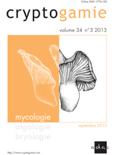
CRYPTOGAMIE MYCOLOGIE
Elevating Mycology Research to New HeightsCRYPTOGAMIE MYCOLOGIE is a prestigious journal published by ADAC-CRYPTOGAMIE dedicated to the study of mycology within the context of ecology, evolution, and biodiversity. With an ISSN of 0181-1584 and an E-ISSN of 1776-100X, this journal is recognized for its significant contributions to advancing knowledge in the field, holding a Q1 ranking in the 2023 Ecology, Evolution, Behavior and Systematics category on Scopus, placing it within the top tier of scholarly publications. Since its inception, with publication years converging from 1990 to 1993 and then from 1995 to 2024, it has served as a vital resource for researchers, professionals, and students alike, offering the latest findings, reviews, and methodologies in mycology. Despite being published without open access options, the journal maintains a strong academic standard and impact factor, established through a rigorous peer-review process. The journal is based in Paris, France, and aims to foster interdisciplinary research that bridges gaps between mycology and related ecological fields.

INSECT SYSTEMATICS & EVOLUTION
Transforming Knowledge in Insect Ecology and BehaviorINSECT SYSTEMATICS & EVOLUTION is a prestigious journal published by BRILL, which has been a vital source of scholarly information since its inception. Specializing in the fields of ecology, evolution, behavior, and systematics within the realm of insect science, this journal garners significant attention with its 2023 ranking in the second quartile across multiple categories, highlighting its relevance and impact in the field. With a focus on advancing knowledge through innovative research and reviews, it serves as an essential platform for researchers, professionals, and students alike, promoting an understanding of insect biodiversity and systematics. The journal’s accessibility options, including its Open Access policy, combined with a broad international scope, ensure that critical findings reach a diverse audience, fostering collaboration and discourse within the scientific community. Situated in the Netherlands, INSECT SYSTEMATICS & EVOLUTION maintains its commitment to excellence and strives to contribute actively to the ongoing dialogue in insect science, making it a must-read for anyone interested in the intricate world of insects.
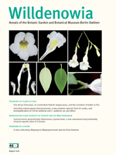
Willdenowia
Unlocking the secrets of plant evolution and behavior.Willdenowia is a prestigious scientific journal published by the Botanischer Garten & Botanische Museum Berlin-Dahlem, dedicated to advancing the field of botany and plant sciences. With an ISSN of 0511-9618, this journal has established itself as a crucial platform for researchers, practitioners, and students interested in ecology, evolution, behavior, systematics, and plant science. The journal boasts an impactful reputation, evidenced by its impressive Q1 and Q2 quartile rankings in Plant Science and Ecology, Evolution, Behavior and Systematics respectively, as well as notable Scopus rankings, placing it within the top quartiles of its categories. Although access is not open, articles published in Willdenowia contribute significantly to the global body of botanical research, making it an essential resource for anyone looking to deepen their understanding of plant biology and related ecological disciplines. The journal has continuously evolved since its inception and aims to facilitate interdisciplinary collaboration and knowledge dissemination in the life sciences.
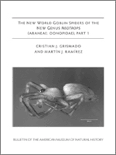
BULLETIN OF THE AMERICAN MUSEUM OF NATURAL HISTORY
Championing high-quality research for a sustainable future.BULLETIN OF THE AMERICAN MUSEUM OF NATURAL HISTORY, published by the American Museum of Natural History, represents a cornerstone of scholarly communication in the fields of Agricultural and Biological Sciences and Ecology. With an impressive impact factor highlighted by its Q1 quartile rankings in both categories, the journal publishes high-quality, peer-reviewed research that significantly contributes to the understanding of natural history. Researchers will find this journal indispensable as it covers a diverse range of topics, providing insights that drive ecological research and biological discovery forward. Although not open access, the Bulletin is widely available through institutional subscriptions, making it accessible to both established professionals and students eager to stay informed about the latest advancements in the field. Its commitment to advancing knowledge from 1996 to the present ensures that it remains relevant and highly regarded within the scientific community.